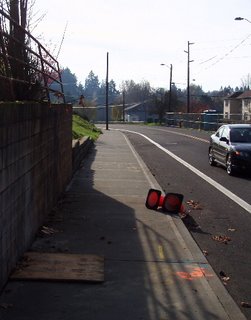
Yesterday I attended an orientation meeting for 40 brave volunteers who will sort through 15,000 visions for the city’s future. I’ll be one of the readers. Talk about eye strain.
It’s all part of the mayor’s city-wide visioning effort, called
visionPDX. The vision responses came from a canvassing effort over the summer. The whole process will culminate in a report and an implementation plan in April.
As the “visioning” has rolled out, I’ve expressed concerns about visionPDX despite its noble intent.
Yesterday’s session didn’t allay them.
The problem with visions is that they are creatures of the present but speculate on a future we can’t know. Imagine how New Yorkers might have changed "visionNYC" responses post 9/11. Or consider the radically altered "visionNew Orleans" post-Katrina.
Couldn’t happen here? Think earthquake, influenza epidemic or volcanic eruption. Or the mere fact that we may continue to grow in population much faster than anyone imagined a mere 10 years ago.
That doesn’t mean we shouldn't have visions, but we need to temper them with the knowledge that events may force us to radically change them.
Another concern is that visionPDX is exclusively associated with Portland city government. For better or worse, we are “governed” by at least four other local entities: the school district, Metro, the county and TriMet. Those governments will be asked to endorse the final visionPDX report. Expect a luke-warm response, at best. Relations between at least a couple of these governments are strained already.
To get buy-in, the other four should have been invited to share in the visioning from the outset. Of couse the real solution is consolidated governance…
That touches on my third and last concern, visionPDX’s relationship to charter revision.
The whole visioning effort needs to be coordinated with charter revision, another commendable Potter initiative. Simply put, “vision” preceeds “revision.”
The commission working on revising Portland’s system of government must create a structure capable of implementing the vision plan. For starters, how many should sit on a new City Council? The commission is already toying with low numbers, like seven versus the current five. I believe that to engage an invigorated citizenry, that number needs to be much larger. Fifteen anyone? 21?
But what do I know? Indeed, what can anyone know until we see what visionPDX produces?

 Yesterday I attended an orientation meeting for 40 brave volunteers who will sort through 15,000 visions for the city’s future. I’ll be one of the readers. Talk about eye strain.
Yesterday I attended an orientation meeting for 40 brave volunteers who will sort through 15,000 visions for the city’s future. I’ll be one of the readers. Talk about eye strain.